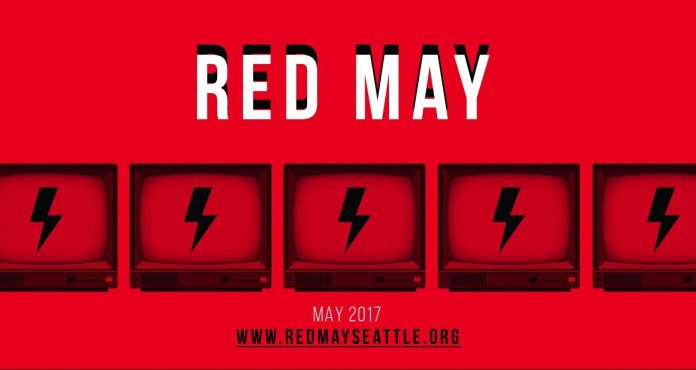Philip Wohlstetter has been stirring the pot in Seattle for quite some time.
In the 1980s Wohlstetter helped launch Invisible Seattle, an artist-led effort to redefine Seattle through projects such as the eponymous collaborative novel formed by interviewing people on the streets.
Now Wohlstetter is turning his efforts to “Red May“, a month dedicated to socialism with free events led by radical thinkers and Marxist-tinged art shows and film screenings. The month of May kicks off with International Workers’ Day, a day dedicated to the labor movement that earned us an eight-hour work day, work safety protections, and more recently a $15 minimum wage in Seattle. This May, the organizers behind Red May want that spirit to bleed into the whole month and encourage Left socializing.
An art exhibit already underway kicks off Red May and is open each evening at INCA Institute from 7pm to 9pm through May 10th. Artists Esther Planas Balduz, Felix Gmelin, Talena Lachelle Queen, Clark Wiegman, RabRab, and Kathleen Skeels contributed works. The Red May website describes the art exhibit like so:
We want Seattle to turn red for a month. To eat red food (apples, red dots, radishes), to wear red accessories, to get caught red-handed reading Karl Marx, and (while the world maximizes human capital) to live prodigally in the red as if there’s no tomorrow. Anyone can play. The rules? There are only two. First, riff on red.
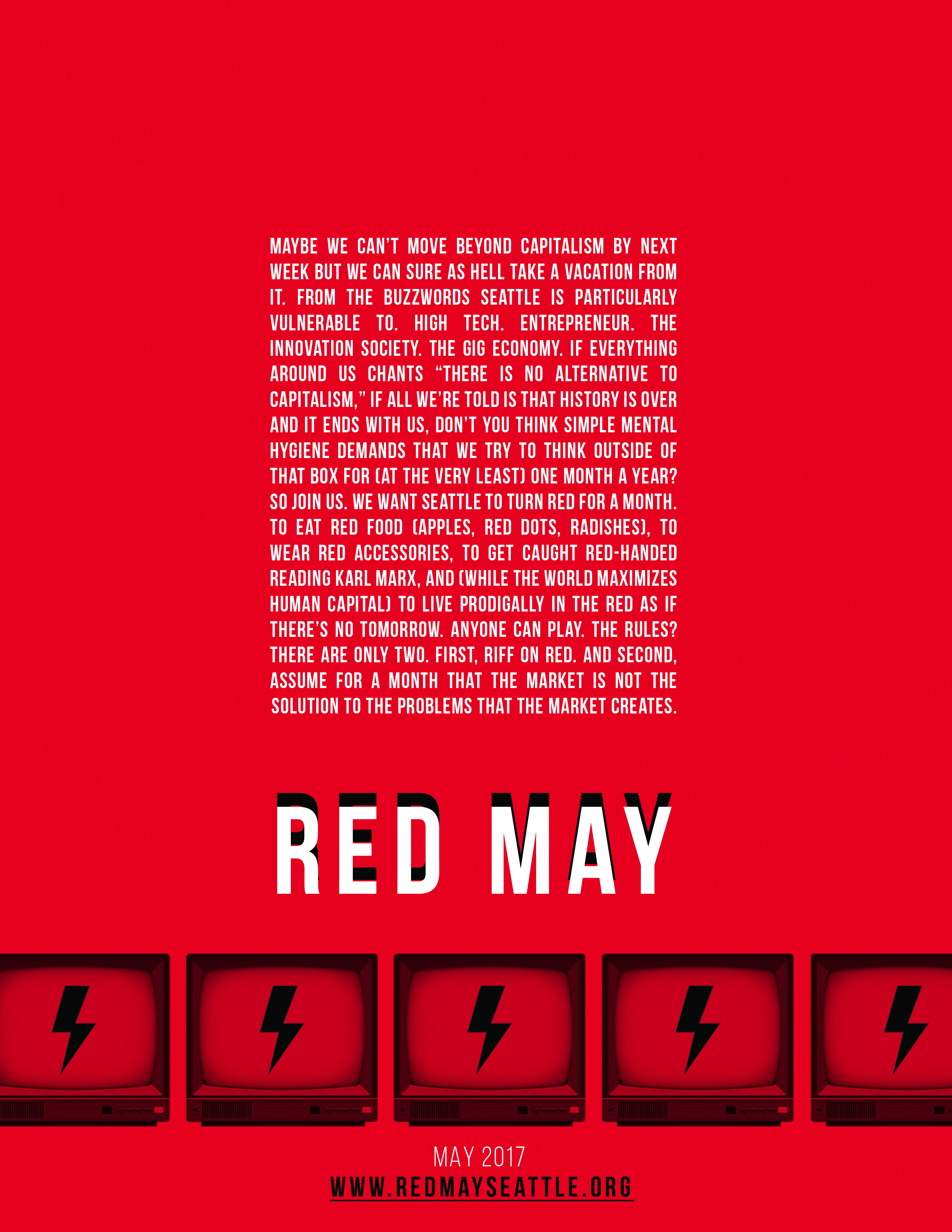
Marx: A Sign To Start Thinking
Turning Seattle red for a month means pushing people to think about our economic system.
“It’s time to start having the space for adult political discussion instead of childish things. If, hitherto in America, Marx is a sign to one, stop thinking. Two, end the discussion. And three leave the room,” Wohlstetter said. “The word Marx has to be a sign–which it is–to start thinking. That’s what is is. An invitation to think with and through Marx.”
“The thing you’re thinking about isn’t some future society,” Wohlstetter said. “You are thinking about capitalism, which you live in. How does it function? Why does it have so many booms and busts? Why is there such inequality that persists? Why, despite the development decade in the 1950s when poverty was going to be ended, was it not ended? Why do we hear the same rhetoric now, except from tech companies about how they’re going to end hunger in Africa?”
“This era of abundance that capitalism promises is a future that will never arrive, but it’s a future that’s essential to make them to put up with the present,” Wohlstetter said. “It’s where the notion of heaven–instead of pie in the sky, pie in the future–goes to make people to put up with conditions if they thought about at length they’d find particularly insupportable, especially for the generation you’re in. I grew up in the boom era where public college tuition was basically free.”
“Thirty years of neoliberalism has simply destroyed any kind of social bond and has reduced everybody to their own bit of human capital that they have to invest in what they think will get them a future,” Wohlstetter said. “The notion of any kind of collective action possibly bringing them any kind of benefits has been attacked for so many years that it’s destroyed. So the question is how do you create a new common sense when people have been telling you there’s no alternative for thirty years.”
Socializing IRL
“This is whole bowling alone syndrome–once we’ve been reduced down to the individual it’s very, very hard,” Wohlstetter said. “When unions were strong, they had union bowling leagues and they tell me they went to summer camps. It was an ability to pick up a sense of perspective of the world instead of trying to get it all on your own. It’s be nice to create a social background for the Left.”
Seattle’s many unions aren’t directly involved in inaugural Red May, Wohlstetter said, but he envisions greater collaboration in future Mays. May 2017 is just the seedling. This year’s slate of events will bring together many influential writers and artists on the Left from across the country in hopes of building energy and momentum. The list of writers presenting is below:
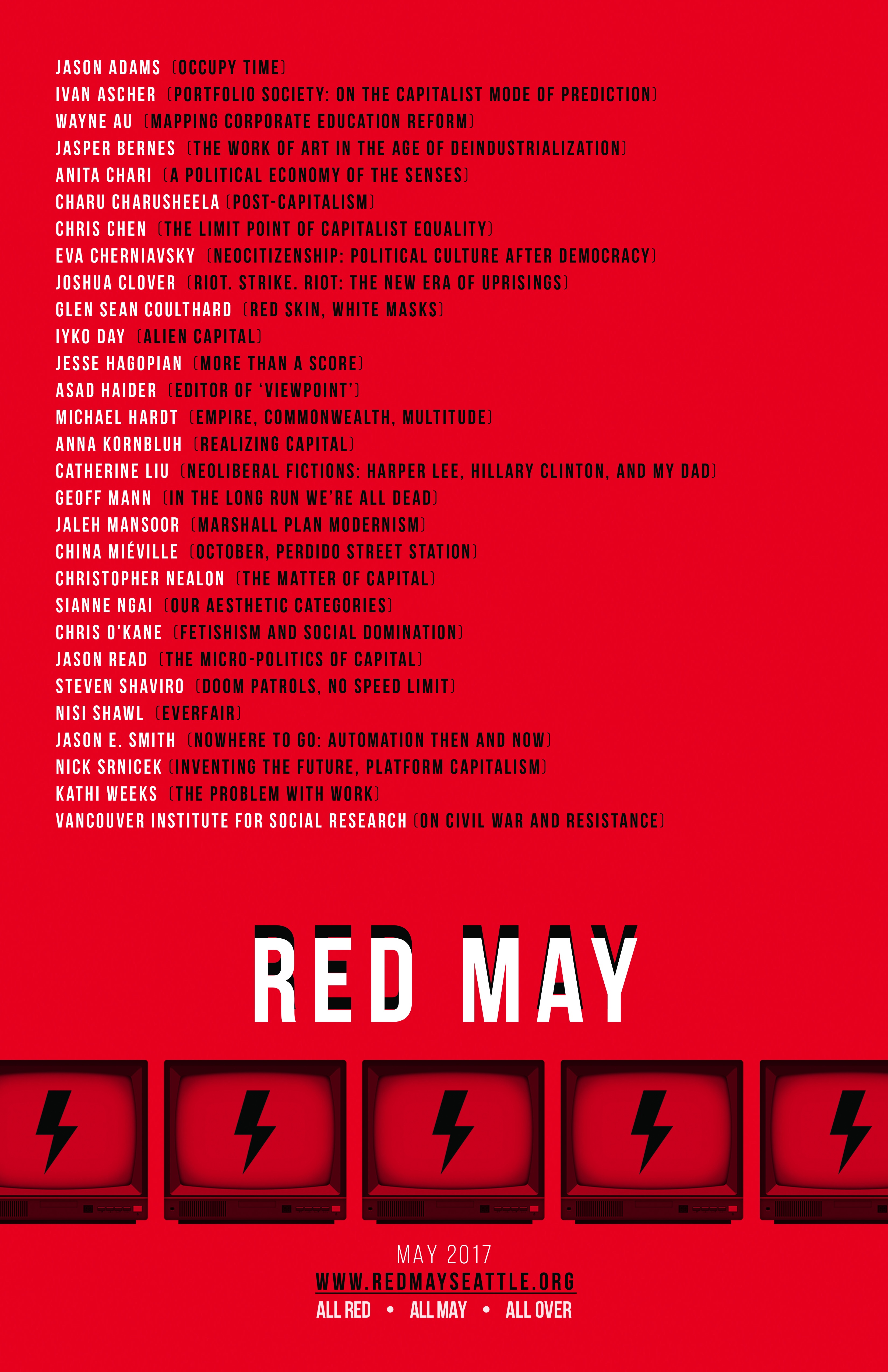
Invisible Seattle, Turned Red
Wohlstetter sees Red May as an extension of what he was doing in the 1980s with Invisible Seattle creating a novel of Seattle by Seattle. Creating the novel then was about encouraging social interaction in the street and cafes of Seattle. The same is true of Red May, but this time the goal is elevating and incubating Leftist dialogue.
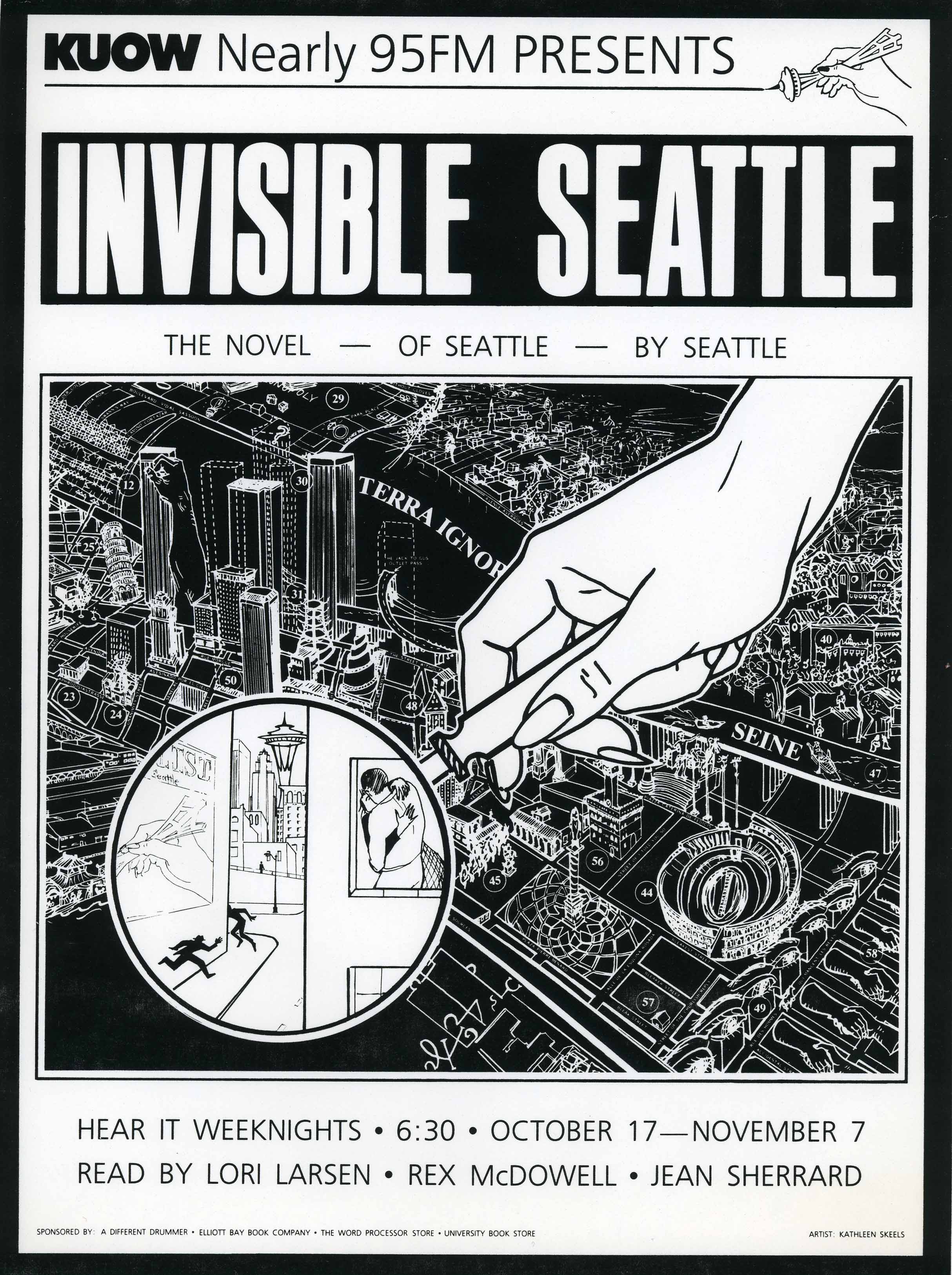
Part of the success of Invisible Seattle was the spectacle. Interviewers who donned hard hats adorned with question marks took to the streets and engaged passersby. The sense of mystery and intrigue permeated the work and propelled it on its way. For Red May the hard hats and lab coats will be replaced with the color red and perhaps other communist iconography. On Thursday, participants will flock to Pioneer Square and sport red for the monthly first Thursday free galleries event titled “Red Flag Ramble Through First Thursday” in Red May’s calendar.
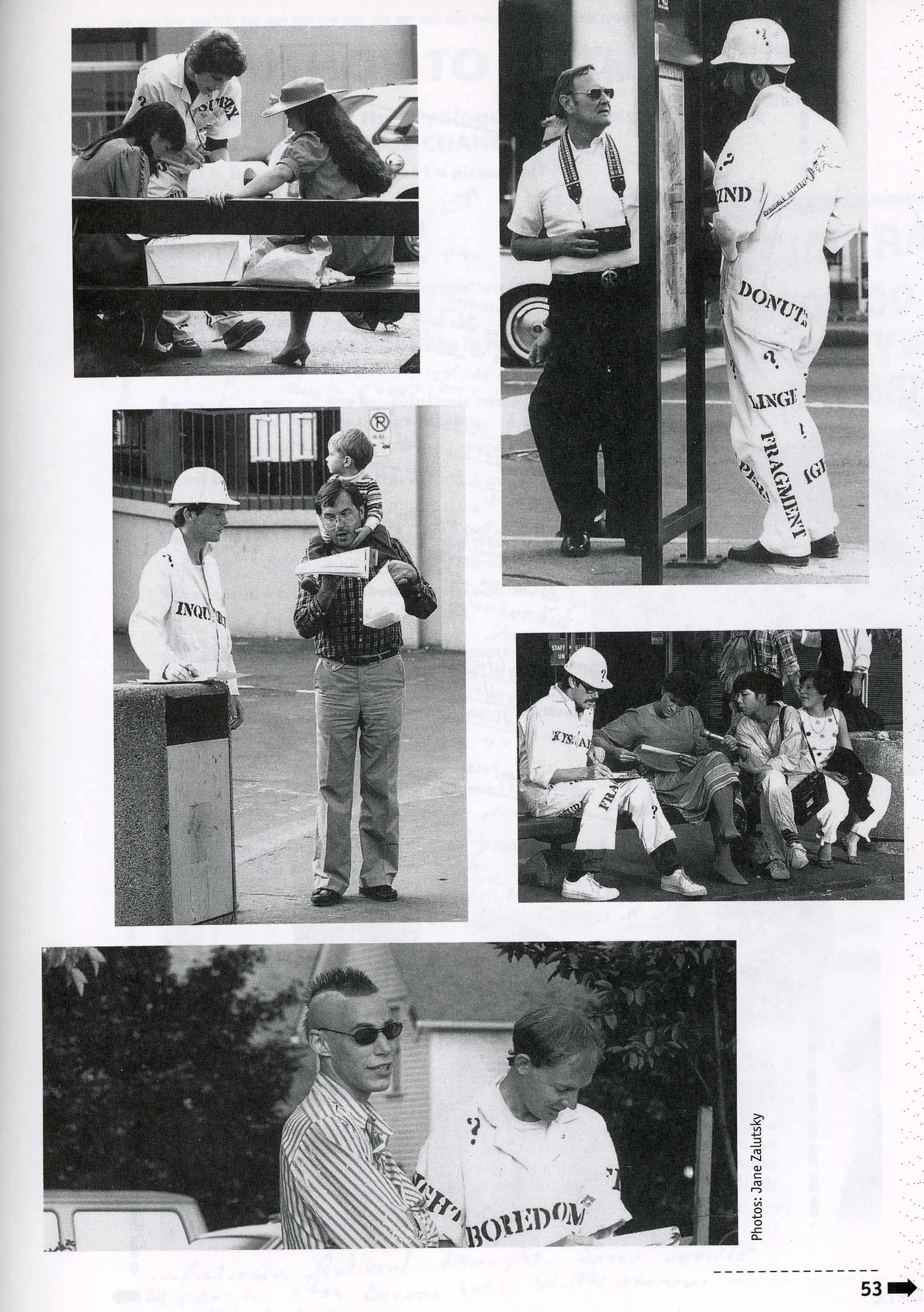
Neoliberalism Defined
Amongst a slate of many intriguing panels, Wohlstetter is moderating a panel on May 20th called “Neoliberalism: Vampire or Zombie?” at Wyckoff Auditorium (second floor of engineering building at Seattle University) from 7:30 to 9:30pm. The panel will seek to answer “is Neoliberalism just a euphemism for Capitalism? Is it an ideology, a mode of rationality, a form of life? By what magic can a worldview that promises nothing but competition and precarity all the way down prevail for so long? How can it be embraced by the very people it crushes? What explains its tenacity, its strange non-death? Is there a way to kill this monster before it kills us? Or are we already dead?” The panel consists of Jason Read, Eva Cherniavsky, Catherine Liu, and Asad Haider.
“What Eva says is what’s crazy about this is if you look at what neoliberalism means, it means that the government abandons the citizens. It dismantles itself, to the point where it gives them less and less. And then the government blames citizens for abandoning them. What’s made citizenship obsolete is the government has taken citizenship apart itself. They’re asking people to become part of an order than no longer exists and they’re taking apart daily. So that’s her contribution to the debate. So she calls it neocitizenship or citizenship-light. What comes after citizenship?”
And in the course of talking to Wohlstetter it becomes clear he favors destroying the two-party system and relieving the stranglehold the Democrats and Republicans have on each end of this relatively narrow spectrum. He sees the two parties as monopolies on politics. And although he sees Republican Party as worthy of extinction, for him the Democratic Party isn’t far behind–maybe unless it roots out the neoliberalism rotting its thinking.
“The problem with the feckless triangulating Democrats, who are equally in with the banks and neoliberal, is they keep touting procedure at a time when the other side is fighting a war,” Wohlstetter said. “What are the appropriate ways of leveraging power? Democrats don’t know that.”
Maybe Red May will have some answers.
Doug Trumm is publisher of The Urbanist. An Urbanist writer since 2015, he dreams of pedestrian streets, bus lanes, and a mass-timber building spree to end our housing crisis. He graduated from the Evans School of Public Policy and Governance at the University of Washington in 2019. He lives in Seattle's Fremont neighborhood and loves to explore the city by foot and by bike.

